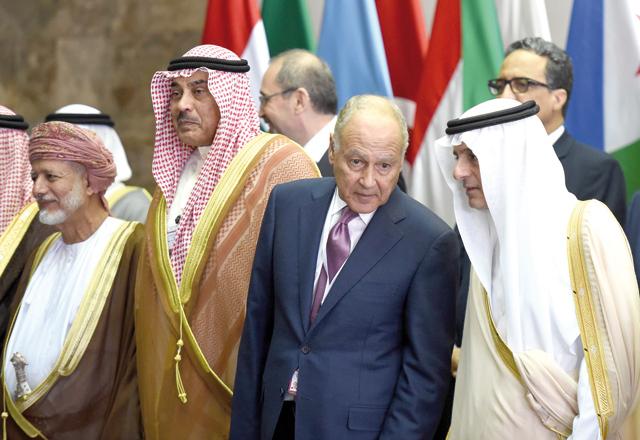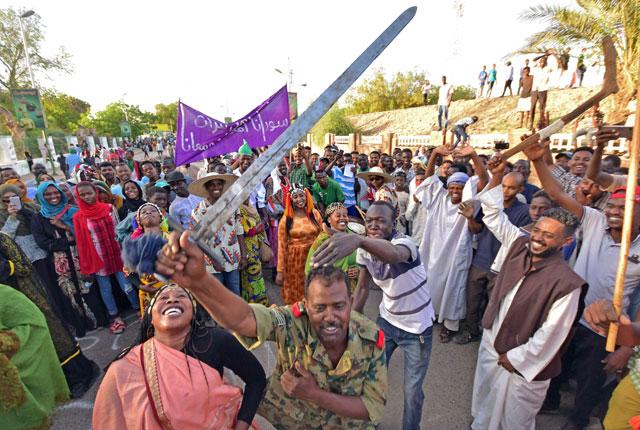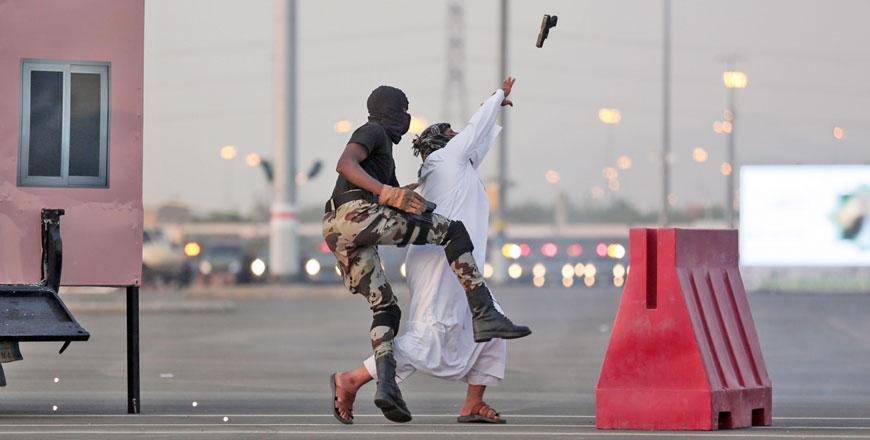You are here
Fate of Jerusalem tops Arab League summit’s agenda
By AFP - Apr 14,2018 - Last updated at Apr 14,2018

Left to right: Oman's Foreign Minister Yussef Bin Alawi, Kuwait Foreign Minister Sheikh Sabah Khaled Al Sabah, Arab League Secretary General Ahmed Aboul Gheit and Saudi Arabia's Foreign Minister Adel Al Jubeir attend the Preparatory Meeting ahead of the 28th Arab summit of the Arab League in Riyadh on Thursday (AFP photo)
RIYADH, Saudi Arabia — Saudi Arabia's push for a tough stand against its regional rival Iran is expected to dominate an Arab League summit on Sunday as regional tensions grow over the wars in Syria and Yemen.
The fate of Jerusalem will also be on the annual summit's agenda, as the United States prepares to move its embassy from Tel Aviv to the disputed city after declaring it the capital of Israel.
Saudi Arabia, which is hosting the summit in its Eastern Province city of Dhahran, is likely to seek Arab support to pile the pressure on Iran, analysts say.
"The Saudis are going to push for a much harsher stance on Iran — not necessarily on the nuclear dossier per se, but on Iranian influence in the Arab countries, particularly Iraq, Syria, Lebanon and Yemen," said Karim Bitar of the Paris-based Institute of International and Strategic Affairs.
Iran's influence is wielded through a land route of armed parties in the Middle East — the so-called "Shiite crescent" that cuts across the mainly Sunni Arab world.
Iran has long been a supporter of Syrian President Bashar Assad and backs Lebanon's Shiite Hizbollah movement, whose fighters are deployed in Syria alongside regime forces.
Iran also supports the Shiite Houthi rebels in Yemen in their war against the Saudi-backed government.
A Saudi-led coalition against the rebels said Friday that it had intercepted a Houthi rocket fired into southern Saudi territory — the third such attack in as many days.
But Iran denies Saudi accusations that it has smuggled arms to the insurgents.
In Shiite-dominated Iraq, the Islamic republic backs armed groups and supports the government.
"It's definitely safe to say that Iran is the centrepiece of this summit", said Andreas Krieg, assistant professor of defence studies at King's College London.
The push against Iran is being led "predominantly by Saudi Arabia and the UAE, along with other Arab countries including Egypt", Krieg said.
"Saudi Arabia has also reached out to Iraq to try and build ties and tackle militias there," Krieg told AFP.
Syria chemical attack and US-led strikes
The summit will be attended by delegations from 21 of the Arab League's 22-member states.
Syria has been suspended from the organisation for the past seven years over Assad's initial crackdown on protests before the uprising turned into all-out war.
Saudi Arabia on Saturday expressed its full support for US-led strikes on Syrian government military installations, saying they were a response to "regime crimes" against civilians.
"Saudi Arabia fully supports the strikes launched by the United States, France and Britain against Syria because they represent a response to the regime's crimes," a foreign ministry statement said.
The statement, carried by the official Saudi Press Agency, said the strikes were prompted by the "Syrian regime's use of chemical weapons against innocent civilians, including women and children".
Saudi Arabia and other Gulf states have been key backers of Syrian opposition groups fighting President Bashar Assad.
Syria serves today as a major pivot between Saudi Arabia and its allies on the one hand, and Iran and Hizbollah on the other.
Each party in the conflict backs opposing sides but all agree that the country's future cannot be decided solely by the Assad regime, whose troops have regained territory with Russia's support.
Fate of Jerusalem
Not on the table at the summit, according to Krieg, is Qatar, cut off from its Gulf allies over accusations of ties to Iran and support for extremists — claims denied by Doha.
On the eve of the summit, Saudi Foreign Minister Adel Al Jubeir confirmed as much, saying a solution for Qatar would be found within the six-state Gulf Cooperation Council.
The summit also comes after 34 Palestinians were killed and hundreds wounded at the hands of Israeli occupation forces in mass protests along the Gaza border during the last two weeks.
The protests are to continue until mid-May, around the time Washington is to move its embassy to Jerusalem, which both Palestinians and Israelis claim as their capital.
Senior Palestinian official Hanan Ashrawi has said she hopes the summit will lead to a resolution, and concrete action, supporting the Palestinian position on Jerusalem.
Related Articles
DUBAI — With Sudan in turmoil following the ousting of their ally Omar Al Bashir, Gulf powerhouses Saudi Arabia and the UAE are following ev
RIYADH — Saudi Arabia is looking to assert its regional leadership against Iran by hosting a summit between visiting US President Donald Tru
RIYADH — Saudi Arabia announced Tuesday the formation of a military coalition of 34 countries to fight terrorism in the Islamic world, in th

















